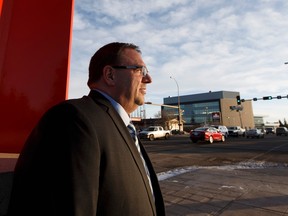“To be told no, you have to consider building a new four-plex in your community to get access to that money, that’s the fear that we have.”

Article content
The Saskatchewan Urban Municipalities Association (SUMA) is raising early alarms over changes potentially coming to the Canada Community-Building Fund (CCBF).
SUMA says preliminary meetings have put forward changes to agreement criteria on how funds provided through the CCBF are to be directed.
Article content
The federal fund currently targets investment in quality-of-life infrastructure projects, such as roads, transportation, wastewater and sewer, fire services and tourism and culture, among others.
Advertisement 2
Article content
According to its federal counterpart, the Federation of Canadian Municipalities (FCM), SUMA said there is “strong signal” that an added stream for affordable housing development is coming.
There will also be a “greater emphasis” from federal purse strings to prioritize that type of spending in municipalities smaller than 30,000, which would include most communities in Saskatchewan.
“What’s concerning us is the change of the criteria where that money can go,” said Gerald Aalbers, vice-president of cities at SUMA and mayor of Lloydminster, Alberta, in an interview Thursday.
“We feel to put that across every municipality in Saskatchewan would be detrimental to those municipalities.”
If instated, these rules would equate to “directing” spending in municipalities’ budgets, undercutting their ability to invest in critical, basic infrastructure, Aalbers said.
“Each community, based on its size, has its own challenges. A village may need to work on their water treatment plant. A town may need to buy a new grader or upgrade equipment. A city, it may be public transit,” he said.
Article content
Advertisement 3
Article content
“To be told no, you have to consider building a new four-plex in your community to get access to that money, that’s the fear that we have.”
More than 770 Saskatchewan communities have received a collective $386 million in per capita allocations from the CCBF, previously known as the Gas Tax Fund, since 2019. The fund overall doles out $2 billion per year across Canada.
SUMA says because the municipal sector only collects a small portion of tax revenues, less than 10 cents per dollar, supplemental funding like from CCBF is critical to properly maintain infrastructure.
Servicing properties for development is the backbone for housing projects and a responsibility “left to municipalities,” said Aalbers.
“There’s a lack of communication and a little confusion from Ottawa, that you can simply build houses and solve the problem. There’s more to the pieces,” he said. “Without infrastructure, you can’t build anything.”
Aalbers said other funding has been made available through the National Housing Strategy to address housing supply, and purposing the CCBF to also target housing is unfair.
Advertisement 4
Article content
“There’s no question housing is on people’s radars, but if you talk to mayors, council members, it may be number four or five or six on their list,” he said.
“What’s happened is we’re seeing a download from the governments above, the feds in this case, through actions of policy and that’s not fair.”
Infrastructure Canada, which oversees the CCBF, did not respond to a request for comment before deadline Friday.
Changes to the reporting requirements for municipalities are also on the table, which both Aalbers and SUMA president Randy Goulden critiqued in a news release.
“The changes being proposed will only increase the administrative burden for municipalities without meaningfully addressing homelessness or affordability,” said Goulden. “Those crises were created by decades of underinvestment by the federal and provincial governments in affordable housing.”
The CCBF “has successfully helped thousands of municipalities across the country” fund projects, FCM president Scott Pearce acknowledged in an emailed response to a request from the Leader-Post.
Advertisement 5
Article content
He said the national association intends to advocate for the “permanent, predictable and flexible funding” provided so far to be “expanded.”
“Our country’s population is growing. This requires that millions of housing units are built but that won’t happen if local governments don’t have access to adequate funding tools to build or renew the infrastructure to go with it,” wrote Pearce.
Recommended from Editorial
Bookmark our website and support our journalism: Don’t miss the news you need to know — add The StarPhoenix.com and LeaderPost.com to your bookmarks and sign up for our newsletters here.
Article content





